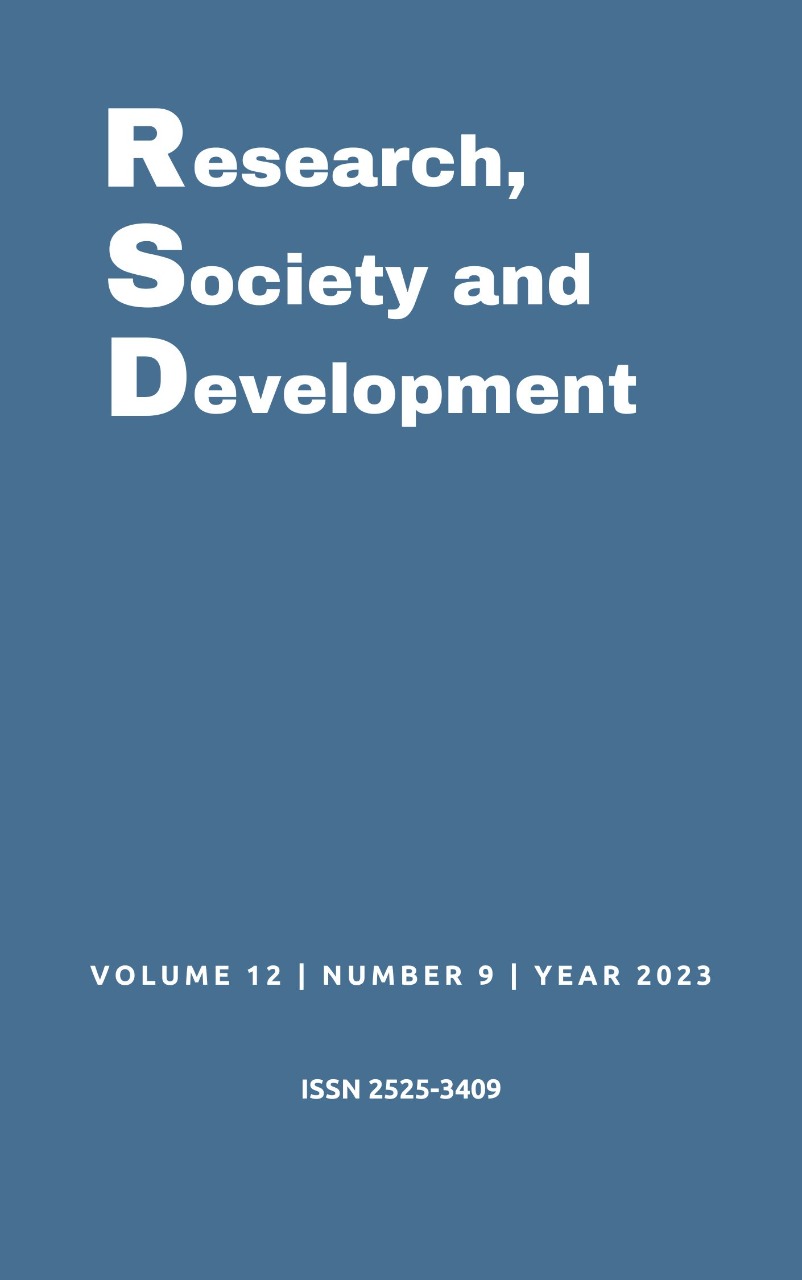Information booklet: Articulating biodegradable product with reading and writing
DOI:
https://doi.org/10.33448/rsd-v12i9.43218Keywords:
Informative pamphlet, Science teaching, Soap, Fair, Entrepreneurship and sustainability.Abstract
This article consists of an experience report carried out at EMEF Escola Municipal João Nelson dos Prazeres Henriques, in Canaã dos Carajás-PA, in a 6th year class, which developed an interdisciplinary Science and Mathematics Fair project, EUREKA, with the subtheme “Biodegradables in the generation of products as a source of sustainable income”, with the thematic focus on cleaning product: soap for cleaning in general, resulting in soap with the fictitious name SaboEco. The objective was to develop an understanding of the informative pamphlet textual genre and how it is used to disseminate information based on soap production, fulfilling Eureka's structuring axes: entrepreneurship and sustainability. As methodological procedures, moments of conversation were provided; moments of studying texts in the informative pamphlet genre; cooking oil collection, experimental activity with soap production, textual production and soap exhibition at the EUREKA Fair. Thus, the results were the construction of the informative pamphlet and the production of soap with the reuse of cooking oil.
References
Barbieri, J. C., & Silva, D. D. (2011). Desenvolvimento sustentável e educação ambiental: uma trajetória comum com muitos desafios. RAM. Revista de Administração Mackenzie, 12, 51-82. https://doi.org/10.1590/S1678-69712011000300004
Bonatto, A., Barros, C. R., Gemeli, R. A., Lopes, T. B., & Frison, M. D. (2012). Interdisciplinaridade no ambiente escolar. IX ANPED SUL, 9, 1-12. https://www.academia.edu/download/55196230/artigo.pdf
Brasil. (1998). Ministério da Educação. Parâmetros Curriculares Nacionais: terceiro e quarto ciclos do ensino fundamental: Língua Portuguesa. Secretaria de Educação Fundamental – Brasília. 1-107. http://portal.mec.gov.br/seb/arquivos/pdf/portugues.pdf
Brasil. (1999). Lei no 9.795, de 27 de abril de 1999. Dispõe sobre a educação ambiental, institui a Política Nacional de Educação Ambiental e dá outras providências. Presidência da República. http://www.planalto.gov.br/ccivil_03/LEIS/L9795.htm
Brasil. (2017). Ministério da Educação. Base Nacional Comum Curricular. http://basenacionalcomum.mec.gov.br/images/BNCC_EI_EF_110518_versaofinal_site.pdf.
De Freitas Mussi, R. F., Fernandes Flores, F. & Bispo de Almeida, C. (2021). Pressupostos para a elaboração de relato de experiência como conhecimento científico. Práxis Educacional, 17(48), 60-77.
Dolz, J., Noverraz, M., & Schneuwly, B. (2004). Sequências Didáticas para o oral e a escrita: apresentação de um procedimento. In: Gêneros orais e escritos na escola. Mercado de Letras.
Dutra, A., Lopes, A. L. C. G., & Santos, G. J. F. dos. (2021). Produção do gênero panfleto com uso do programa Publisher: proposta de trabalho com alunos do ensino fundamental. Revista Educação Online, 16(36).161-176. http://educacaoonline.edu.puc-rio.br/index.php/eduonline/article/view/855
Freire, P. (2002). Pedagogia da autonomia: saberes necessários à prática educativa. (25a ed.). Paz e Terra.
Henares de Melo, M. C., & Cruz, G. de C. (2014). Roda de Conversa: uma proposta metodológica para a construção de um espaço de diálogo no Ensino Médio. Imagens Da Educação, 4(2), 31-39. https://doi.org/10.4025/imagenseduc.v4i2.22222
Leis, H. R. (2005) Sobre o conceito de interdisciplinaridade. Cadernos de pesquisa interdisciplinar em Ciências humanas. https://cmapspublic2.ihmc.us/rid=1181318845890_1252767148_7539/CadPesIDCieHum_2005_73_1.pdf
Lopes-rossi, M. A. G. (2006). Gêneros discursivos no ensino de leitura e produção de textos. In Karwoski, Acir Mário et. al. (orgs.). In Gêneros Textuais: Reflexões e ensino. (2a ed.). Lucerna, 73-84.
Luis, C., & Gasparin, L. (2017). Contrato de convivência em sala de aula: o que é? como fazer? Mais Educação. https://www.maiseducacao.blog.br/2017/12/contrato-de-convivencia-em-sala-de-aula.html#:~:text=O%20contrato%20de%20conviv%C3%AAncia%20tem,dentro%20de%20sala%20de%20aula.
Marcuschi, L. A. (2008). Produção textual, análise de gêneros e compreensão. Parábola Editorial.
Neves, S. R. G., & Gonçalves, T. V. O. (1989). Cad. Cat. Ens. Fís., 6(3), 241-247, file:///C:/Users/VANIA/Downloads/Dialnet-FeirasDeCiencias-5166071.pdf
Oliveira, M. D. S. (2010). Gêneros textuais e letramento. Revista brasileira de linguística aplicada, 10, 325-345.https://doi.org/10.1590/S1984-63982010000200003
Pereira, A. S., Shitsuka, D. M., Parreira, F. J. & Shitsuka, R. (2018). Metodologia da Pesquisa Científica. UFSM. https://repositorio.ufsm.br/bitstream/handle/1/15824/Lic_Computacao_Metodologia-Pesquisa-Cientifica.pdf?sequence=1.
Pombo, O. (2006). Interdisciplinaridade e integração dos saberes. Liinc Em Revista, 1(1). https://doi.org/10.18617/liinc.v1i1.186
Rodrigues, M. A. N., & Carvalho, A. de P. (2014). A pasta do gênero a serviço da educação ambiental. Revista Eletrônica Em Gestão, Educação E Tecnologia Ambiental, 18 (2), 982–989. https://doi.org/10.5902/2236117013794
ZancuL, M. C. de S. (2008) O ensino de ciências e a experimentação: algumas reflexões. In: Pavão, Antonio Carlos; Freitas, Denise de. Quanta ciência há no ensino de ciências. EdUFSCar São Carlos, 63-68.
Downloads
Published
Issue
Section
License
Copyright (c) 2023 Vânia Ferreira Braga; Valéria Pereira da Silva Braga

This work is licensed under a Creative Commons Attribution 4.0 International License.
Authors who publish with this journal agree to the following terms:
1) Authors retain copyright and grant the journal right of first publication with the work simultaneously licensed under a Creative Commons Attribution License that allows others to share the work with an acknowledgement of the work's authorship and initial publication in this journal.
2) Authors are able to enter into separate, additional contractual arrangements for the non-exclusive distribution of the journal's published version of the work (e.g., post it to an institutional repository or publish it in a book), with an acknowledgement of its initial publication in this journal.
3) Authors are permitted and encouraged to post their work online (e.g., in institutional repositories or on their website) prior to and during the submission process, as it can lead to productive exchanges, as well as earlier and greater citation of published work.


